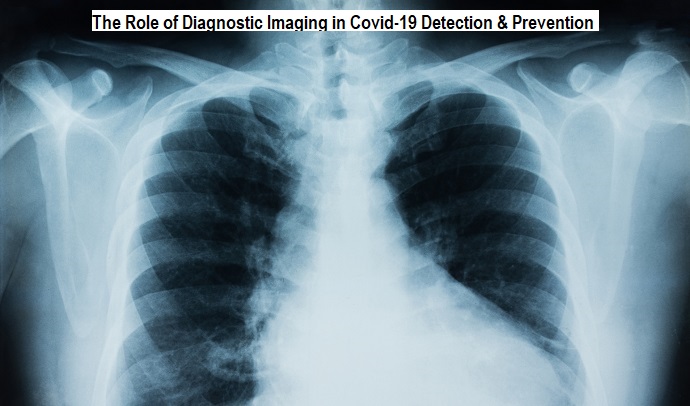With the unstoppable spread of coronavirus across the globe with the rise and fall of the peaks, almost every healthcare professional and organization is focused on bringing up a solution that may help to stop or even manage the spread of Covid-19. Apart from the popular testing techniques for Covid-19 such as PCR tests, LFTs, and antibody testing, many health care institutions have turned to diagnostic imaging tools with the very objective of improving detection and disease management.
Role of Diagnostic Imaging in Covid-19
Amongst the many diagnostic imaging techniques, CT scans are the most likely tactic helping through the detection of Covid-19 and accelerating the treatment for already-confirmed patients.
“CT scans could really help to boost the battle against coronavirus”, says Yaneer Bar-Yam, Founder & President, New England Complex Systems Institute, an academic research institution. CT scans help detect the virus and be used to determine the lung and chest health of the already confirmed patients.
Though a very small number of Covid-19 patients gets through the process of diagnostic imaging, healthcare institutions worldwide are enforcing upon it. Scanning through the chest and lungs of Covid-19 patients can help to analyze the kind of treatment they might require and help accelerate the treatment for patients whose symptoms aren’t strong, but the internal conditions continue growing worse.
Coronavirus is a relatively newer disease and comes with a wide range of symptoms. From as obvious as the loss of smell and taste to as typical as a massive drop of oxygen, the symptoms of Covid-19 are unusual. They often put both the patients and healthcare professionals into mysterious situations. Also, there is no surety that something else wouldn’t come up as a Covid symptom in the future. With so many discoveries made in almost two years and many more in process, there’s a lot we are likely to learn about this deadly virus. However, the key right now is to stop or prevent the spread.
PCR
While PCR or antibody testing could only confirm if the patient is Covid positive, CT scanning can help determine if the patient has serious lung or chest damage. There are some patients with almost no symptoms, yet their chest and lung scanning come out adverse. Thus, testing both the Covid suspects and confirmed cases via CT scanning to know if they require instant treatment.
Also, the PCR testing is lengthy and produces results much slower. When a PCR test confirms the patient with Covid-19, they usually have already infected a bunch of people from their surroundings, and the chain continues. Testing through CT scans could fasten the process, giving out instant results so the confirmed patients could isolate instantly and prevent the spread.
Many healthcare organizations have identified the potential of CT scans in the prevention and management of Covid-19, so they are launching incredible programs in their favor. NIH has recently announced the launch of Medical Imaging and Data Resource Center; a project focused on leveraging medical imaging in combination with artificial intelligence to bring advancement in the treatment and detection of Covid-19.
The effort would be supervised by the National Institute of Biomedical Imaging and Bioengineering and is certainly focused on developing and implementing newer diagnostic techniques with the help of machine learning and artificial intelligence. The primary objective is to develop solutions that can bring advancement to the Covid-19 treatment and detection methods.
XPRIZE Pandemic Alliance
The New England Institute of Complex Systems has also announced the launch of a Covid-19 CT Scan Collaborative in partnership with XPRIZE – a pandemic alliance. The primary objective behind this alliance is to quickly improve the outcomes by helping radiologists view anonymous CT Scans from around the globe. Typically, developing new radiology protocols might take years of ineffective development, and so this collaboration is to accelerate the process, and so does the usage of CT Scans in diagnosing Covid-19.
The alliance also offers a winning fund of & 1.8 million for the research teams capable of developing the most efficient CT scanning protocols to fight against Covid-19. The protocols would be judged based on their potential to reduce virus transmission.
“To face the Covid-19 crises is becoming the world’s most critical challenge, specifically as we rely upon invasive and slow testing methods”, says Amir Banifatemi, Lead, and Chief Innovation and Growth Officer, XPRIZE Pandemic Alliance.
“However, we can surely accelerate critical response efforts and determine breakthrough solutions for the disease using CT scans as they help make earlier and much clearer detections. The efforts being made in developing adequate radiology protocols to use CT scans for testing Covid-19 patients can surely bring advancement to the overall process of virus detection and treatment”, he further added.
These international efforts in bringing CT scans at the center of Covid-19 diagnostic methods are backed with research. A group of researchers from Mount Sinai studied multiple pieces of evidence to determine the potential of diagnostics imaging in reducing the Covid-19 impact. Their findings were published in the Nature Medicine Journal and states that artificial intelligence could help in the quick detection of Covid-19 based on a patient’s chest CT scan and clinical history.
This is a significant method that can help improve Covid-detection – a really important piece of information to keep the patients isolated even if their scans don’t decipher a lung disease when they arrive with symptoms initially. Unfortunately, because the symptoms of Covid-19 are often unspecific, it’s really difficult for health practitioners to recommend testing efficiently.
Though CT Scans aren’t being used much aggressively in Covid-19 detection and treatment, medical imaging analytics could surely play a crucial role in managing pandemics.
Imaging is quick and can help with an accurate diagnosis. While the lab tests take up to twelve hours to produce a result, and that too with the possibility of false negatives, diagnostic imaging is proactive and quick – helping to isolate confirmed patients in time and preventing further spread. Also, the AI technology introduced is highly sensitive to the patient’s symptoms and lets the physician have a second opinion. Some patients with negative CTs are also likely to have the virus (in the early stage), so AI integration could help with the instant detection of Covid-19.
To put it all short and condensed, diagnostics imaging plays a crucial role in the detection and prevention of Covid-19 with its quick and efficient testing capabilities. It helps through the quick detection of the virus and aids in the acceleration of treatment by diagnosing the exact damage caused to the patients’ lung and chest.
Though many healthcare institutions are already utilizing diagnostic imaging services for smart detection and treatment of Covid-19, there’s still a lot of effort required to bring forth this testing technique’s potential. Researchers are being called out, and collaborative centers are progressively trying to prove the credibility and perfection of CT Scans. However, we still have a long way to go for the outcomes.
If you feel the symptoms of Covid-19, it’s always ideal for getting yourself tested instantly or consult your physician. Delay in testing could result in the uncontrollable spread of the virus and is most likely to adverse your condition at the same time.











